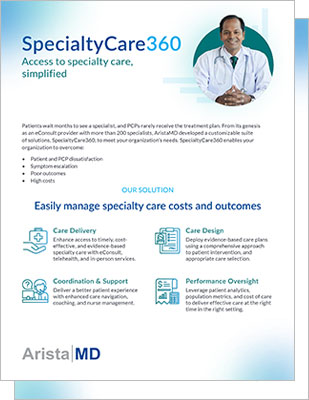In an industry plagued by complexity, AristaMD brings a suite of specialty care management services to improve patient access, reduce cost, and improve outcomes. Learn how we augment your needs by customizing programs that include:
- Care delivery
- Care support
- Care design
- Performance oversight
We work with you to determine what support your organization needs to deliver effective, high-quality care.

Targeting Healthcare Cost Savings with Specialty Care Management
At-risk practices focusing on specialty care management see the greatest benefits from their eConsult programs — healthcare cost savings and improved patient outcomes. With considerable time and effort, at-risk practices identify patients at high risk of serious health events, such as emergency department visits or inpatient hospitalizations, and prevent them. At AristaMD, we are taking this strategy to the next level by considering which specialties have:
- Long wait times
- Higher costs
- Address conditions easily managed in the primary care setting
Using eConsults for specialties with these characteristics are the most likely to drive healthcare cost savings, improve outcomes and decrease the risk of:
- ED use – a costly alternative to a specialist visit.
- Unscheduled or canceled specialty care appointments.
- Boomerang appointments to primary care.
Specialties with Long Wait Times
Evaluating wait times is more complicated. Specialists are often concentrated in urban areas and maldistributed throughout the country. In the 2022 Survey of Physician Appointment Wait Times and Medicare and Medicaid Acceptance Rates, Merrit Hawkins reports that the average wait time to see an orthopedic surgeon is 16.9 days. However, the average across the U.S. reflects relatively short wait times in some areas.
The average wait time to see an orthopedic surgeon is 16.9 days, up from 11.4 days in 2017, a 48% increase. Average wait times to see an orthopedic surgeon range from a high of 55 days in San Diego to a low of 5 days in Washington, D.C.
The same report indicates that the average appointment wait time in all five specialties surveyed was 45.6 days in Portland, Oregon. One driver of these long wait times is that not all specialists accept Medicare and Medicaid. This is also an issue for patients with traditional healthcare coverage.

